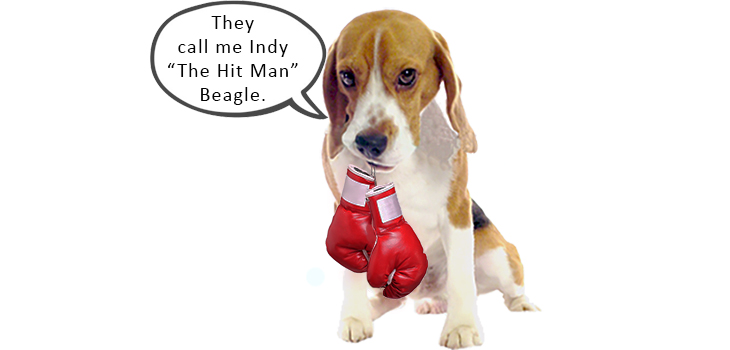I ate too much and it made me heavy and slow.
Using too many words is like eating too much.
It makes communication heavy and slow.
Short sentences hit harder.
Nouns and verbs are fists that deliver punches.
Adjectives and adverbs are gloves that soften the blows.
Unless they are unexpected.
A brass-knuckled uppercut is an unexpected adjective that modifies a noun you didn’t see coming.
“Your soup tastes like old socks that have been marinated in diesel, sprinkled with urine, and baked for three days covered in a sack that’s been used to wipe a donkey’s backside.”– Richard Poole, Death in Paradise, Season 1, episode 6
Soup is the subject.
Tastes, marinated, sprinkled, baked, covered, used, and wipe are the verbs.
Socks, diesel, urine, days, sack, and backside are the nouns.
Unexpected words unleash vivid images when they splash onto your mind.
We’re driving through Mike’s Express Car Wash in Indianapolis.
- A 4,000,000 BTU heater ensures the water never drops below 180 degrees. Hot water cleans better than cold water because it delivers more stored energy.
- Soap unleashes hungry electrons that dissolve the road film clinging to our car.
- Pressure pumps give the water kinetic energy as it is fired from the nozzles of the guns.
- Brushes and mitters deliver mechanical vibration, a fourth kind of energy.
- The soft-water rinse is chased by a tornado that rocks our car and leaves never a trace of moisture.
Emerging from the tunnel, we look like we’re driving off the showroom floor.
A well-written paragraph unleashes bright colors like a car wash in Indianapolis.
- Similes and metaphors allow us to use the known and familiar to reveal the unknown and unfamiliar, like a father telling his son about the birds and the bees.
- Paired opposites give us the power to shine light in dark places and bring wellsprings of water to thirsty deserts.
- Rhythms of stressed and unstressed syllables make our words memorable. Meter is music. Meter is magic.
- Alliteration gives us the ability to accelerate all 43 phonemes, like many mumbling mice making midnight music in the moonlight. Mighty nice.
- The names of shapes and colors and familiar things allow us to project images onto the movie screen of the mind.
Words give us the power to speak worlds into existence.
What future will you set in motion today?
Roy H. Williams
 “A novelist is in the same business that God is in. You’re creating a world, universes, the people in them. I think that language is not the frosting; it’s the cake. I mean we are all, as human beings, caught up in a web of narration, this great narrative web, and we have always defined ourselves, human beings, through narration, through stories. But language is what it’s made of — it’s what the stories are made of.” – Tom Robbins, April 28, 2014, to Mara Altman in The Kindle Singles Interview
“A novelist is in the same business that God is in. You’re creating a world, universes, the people in them. I think that language is not the frosting; it’s the cake. I mean we are all, as human beings, caught up in a web of narration, this great narrative web, and we have always defined ourselves, human beings, through narration, through stories. But language is what it’s made of — it’s what the stories are made of.” – Tom Robbins, April 28, 2014, to Mara Altman in The Kindle Singles Interview
 Douglas Smythe hosts a breakfast-hour YouTube show called I’d Lather Be Shaving. As a result, he has enjoyed booming demand for his safety razors, blades, and other related products. Douglas says men remember their fathers and grandfathers using safety razors and they provide a more comfortable shave despite all the hype around 3-blade and 5-blade cartridges. But seriously, can answers and entertainment make safety razors interesting on a daily basis? Listen and learn as roving reporter Rotbart and Douglas Smythe shave the hair off the truth and look into the eyes of its naked face at MondayMorningRadio.com
Douglas Smythe hosts a breakfast-hour YouTube show called I’d Lather Be Shaving. As a result, he has enjoyed booming demand for his safety razors, blades, and other related products. Douglas says men remember their fathers and grandfathers using safety razors and they provide a more comfortable shave despite all the hype around 3-blade and 5-blade cartridges. But seriously, can answers and entertainment make safety razors interesting on a daily basis? Listen and learn as roving reporter Rotbart and Douglas Smythe shave the hair off the truth and look into the eyes of its naked face at MondayMorningRadio.com
 PS – Rotbart brand razors, blades, and accessories were the best-selling shaving products in Germany in the early 20th Century. When Gillette bought Rotbart in 1927, they adopted Rotbart’s patented designs and have been selling them worldwide ever since. And that’s Today’s Trivia from Indy Beagle. I’ll see you in the rabbit hole.
PS – Rotbart brand razors, blades, and accessories were the best-selling shaving products in Germany in the early 20th Century. When Gillette bought Rotbart in 1927, they adopted Rotbart’s patented designs and have been selling them worldwide ever since. And that’s Today’s Trivia from Indy Beagle. I’ll see you in the rabbit hole.
